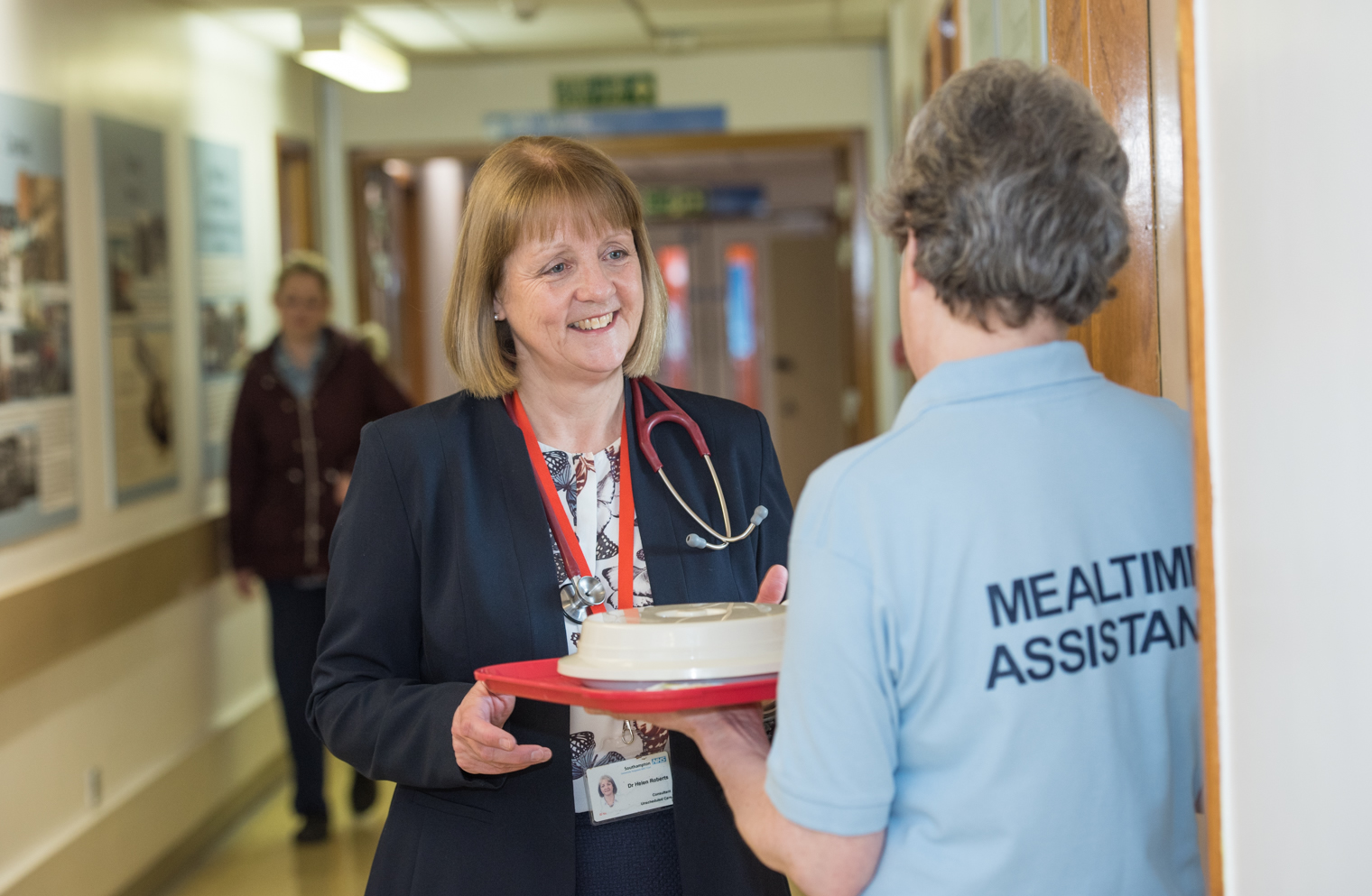Hartley News Online Your alumni and supporter magazine
Making life taste better – Introducing volunteer mealtime assistants for older inpatients
Dr Helen Roberts, Associate Professor in Geriatric Medicine
Poor nutrition in hospital inpatients is a problem that is becoming increasingly recognised both in the UK and worldwide. It is a problem that requires a multifaceted approach which includes protected meal times, using red trays to alert staff to patients needing additional support, and protein and energy supplements when needed.
One factor that particularly affects older inpatients is the amount of help they have at mealtimes. It is well-recognised that time-pressured nursing staff may not have the time they need to help patients with their meals in a busy ward environment. In 2011 we recruited volunteers through the hospital voluntary services team and trained them to act as ‘mealtime assistants’ at lunchtimes on one of the Medicine for Older People wards at University Hospital Southampton. The volunteers helped prepare patients for their meal by offering hand wipes, clearing the bedside table, opening food packaging, encouraging and physically feeding patients if they needed it, as well as chatting to them, much like a family member or carer might in their own home.
Over a year, the 29 volunteers helped inpatients on a total of 3,911 occasions on just one ward. The results showed that mealtime assistants were highly valued by patients, relatives and nursing staff and improved the quality of mealtime care for patients and staff.
The initial study was funded by the National Institute for Health Research Southampton Biomedical Research Centre and the Medical Research Council Lifecourse Epidemiology Unit at the University. We now have the support of The National Institute for Health Research Collaboration for Leadership in Applied Health Research and Care (NIHR CLAHRC) Wessex to extend the research. The CLAHRC is funded by the Department of Health through the NIHR, and its primary aim is to improve the health of people in the Wessex area by implementing research into health and wellbeing. I lead on the Ageing and Dementia Theme – there are six in total, looking at different areas of health needs. My colleague Dr Chris Kipps is working on research to improve the way people with dementia are diagnosed and supported by GPs.
Now I’m building on my initial research to measure how we expand the use of mealtime assistants across five different hospital departments at University Hospital Southampton (Medicine for Older People, the Acute Medical Unit, Adult Medicine, Trauma & Orthopaedics and Surgery). Our study is focused on patients over the age of 70 years on these wards. That’s where we need volunteers, and that’s where you might be able to help.
We want to increase the numbers of people who give up just a few hours of their time each week, to come in and support patients at lunchtime and evening meals. Volunteers will be fully trained and we can be very flexible to accommodate volunteers’ availability, we just need volunteers to commit to supporting the programme once a week. For undergraduates in the health sciences, or postgraduates looking to expand their ward experience and understanding of clinical practice in care for older people, this may be a fantastic opportunity. In addition, for members of staff considering volunteering opportunities, this could be a rewarding and flexible opportunity for you. Our current volunteers certainly get a lot of satisfaction from their roles and some have been mealtime assistants for four years now.
The overall aim of the CLAHRC research is to assess how practical it is to recruit, train and retain mealtime assistants on such a large scale, as well as assessing how patients, relatives and staff feel about them. We are interviewing patients and relatives, nursing staff and volunteers to capture their experiences of mealtime assistance. We are also recording food choice and measuring the amount of food patients eat before and after the introduction of the mealtime assistants in each department. At the end of the study, we hope to be able to describe the process of successfully establishing a team of mealtime assistants in these different departments as a blueprint for other hospitals.
It seems to me to make sense to help and support our nurses, health professionals and improve the lives and experiences of our patients when they need it most. I am passionate about this and I hope you can share some of my enthusiasm.
To find out more about becoming a mealtime assistant, please contact our hospital voluntary services manager, Kim Sutton, on Kim.Sutton@uhs.nhs.uk or download the application form here:
http://www.uhs.nhs.uk/WorkingHere/Volunteering/Volunteering.aspx
